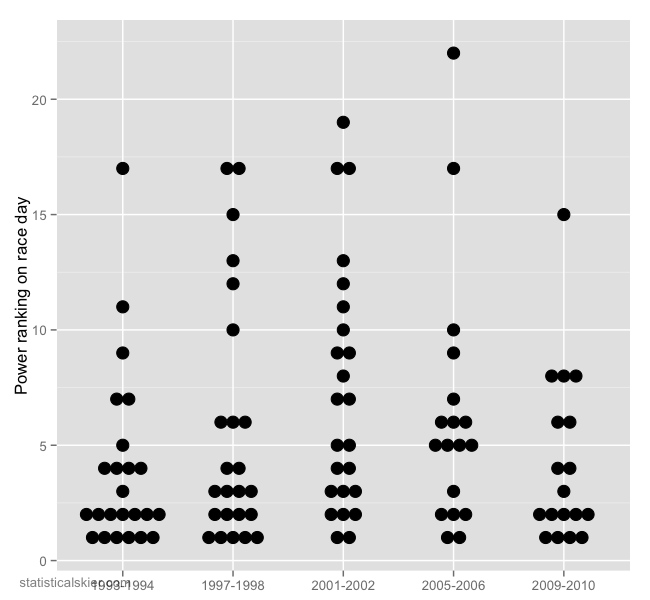Sometimes people you don’t expect race very fast. A reader asked me to look into this general topic, this will be the distance race installment. I’ll do a sprint version in a few days.
I’m going to focus here on people who have won Olympic medals in distance events. To measure how “unexpected” it was, I’m going to use my power ranking methodology, which is essentially a modified ELO ranking. The only caveat there (aside from the fact that you have to believe that my power rankings generally work) is that I ran them only for each Olympic year. If I wanted to be more thorough, I’d run every season consecutively, so that the ELO rankings pass on information from one season to the next. But the results from a single season seemed plausible enough that I didn’t see the need, at the moment, to do all that extra work.
The following graph shows all Olympic distance medal winning results for the past five Olympics, and each skier’s “power ranking”, as determined by my ELO method, on the day of their medal winning result.
The pattern here is a little more obvious if you use boxplots, but it’s still visible, and I prefer to be able to see each data point. Basically, virtually every medal winner in 1994 was more or less “expected”, coming from the top five in my power rankings. The Nagano Olympics saw a slight increase in “unexpected” medalists. The Salt Lake games saw quite a few, half falling outside the top five in my power rankings for that season. Then we simply reverse the process, with slightly fewer unexpected results in Torino, and then even fewer in Vancouver. I’ll let you draw your own conclusions.
Among these, the most unexpected Olympic distance medalists include many questionable results. The two most egregious are by Mikhail Botvinov, his silver in the 30k at Salt Lake where he stood at 19th in the power rankings, and his bronze in the 50k in Torino where he stood at 22nd in the power rankings on that day. Markus Gandler and Christian Hoffman are right up there with him.
Some unexpected medalists are actually just stars being born, such as Justyna Kowalczyk’s bronze in the 30k in Torino at the age of 23. Others aren’t necessarily suspicious, but are definitely surprising: Marit Mikkelsplass’s silver in Lillehammer. A talented skier, no doubt, but her World Cup results that season were 7th, 10th, 12th, 12th, 15th, 16th, 19th, 21st and 21st.
Others are surprising perhaps because they come from talented skiers who’s best seasons might have been in the rear view mirror (Axel Teichmann’s silver in Vancouver 50k). Surprising results coming in the longer distance races is another pattern, perhaps because they fall at the end of the Olympics, and tend to see slightly smaller fields.

{ 1 } Comments